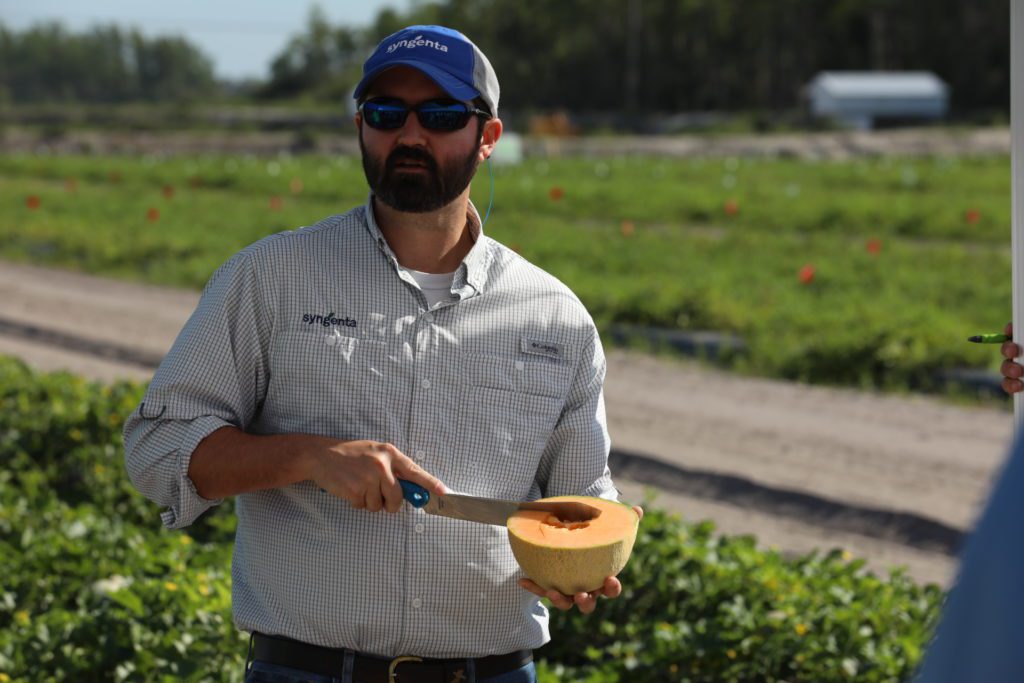Jul 20, 2018Syngenta trial events showcase vegetable breeding innovation
Syngenta kicked off its 2018 trial event series in Naples, Florida, highlighting advancements in vegetable breeding to customers from across the Southeast. These trials illustrate the company’s continued commitment to be a leader in vegetable seed research and development. In Naples, seed resellers and growers had the opportunity to see, touch and taste new and experimental varieties and hear about the benefits these introductions will bring to the market.
“These events provide a crucial opportunity for us to interact with growers and shape our breeding strategies based on their feedback and personal experience,” said Javier Martinez-Cabrera, head of vegetable seeds for Syngenta, North America. “We’re proud to offer growers the best genetics that can help them meet market needs and address local production challenges.”
The Naples event is the first in a series over the course of the summer. Additional events will take place in Woodland and Gilroy, California; Plainfield, Wisconsin; Pasco, Washington; Hall, New York; and Stanton, Minnesota.
The following summary provides a snapshot of standout varieties and innovative solutions featured at the Naples event. Attendees at future events will experience some of these varieties, as well as others specifically tailored to meet local production challenges and market needs.
Bean
Two new bean varieties, Outlaw and Desperado, showed great seed quality and early maturity at the Naples station. Desperado matures three days early, helping growers get to market sooner. Outlaw features a straight bean with great holding and low risk of lodging.
“Historically our bean varieties have been known for stress tolerance and pod marketability,” said Andrew Bryan, product manager, fresh large-seeded vegetables (LSV) at Syngenta. “Increased yield and seed quality are also top priorities for our breeding department, and we are showing that with our current new product introductions.”
Melon
Athena has been available for 25 years and sets the industry standard for eastern shipper varieties. Accolade is an evolution of Athena’s heritage to meet specific needs in the market. Another eastern shipper variety, Astound, also provides growers with great internal fruit quality and flesh firmness for extended shelf life.
“Our melon program has been a reliable source of high-quality melon varieties for growers for decades,” said Bert Stoddard, product manager, melon and squash, at Syngenta. “We’re excited about the opportunities our newest introductions bring to continue this tradition.”
Pepper
Outsider was a highlight at Naples, performing well even under stressful conditions. Outsider is a two-pick pepper, with some locations seeing continuous picking conditions.
“Growers are always seeking market versatility,” said Rachel Broadbent, product manager, pepper and tomato, at Syngenta. “Varieties featured at Naples like Outsider and Standout offer opportunities for both field pack and place pack markets.”
Squash
Grandprize squash and Everglade zucchini were new introductions featured in the trial. A direct upgrade from Envy, Everglade produces higher yields and offers improved flavor for consumers. “Grandprize directly addresses the needs we’ve heard from growers in the field,” said Stoddard.
Sweet Corn
Several sweet corn varieties were featured at the Naples trial event, including Attribute II offerings with tolerance to glyphosate and glufosinate herbicides for greater flexibility in weed management.
“Growers are always looking for ways to improve production convenience and efficiency,” said Bryan. “With features like the Attribute II trait stack and a variety of endosperm types, we are creating new opportunities for growers to produce high-quality using the same weed control program they are currently applying to their field corn acres.”
Tomato
Attendees were able to see a number of tomato varieties that offer flexibility for multiple planting slots, including a new, mature green variety Varsity. Varsity is well-suited for the Florida and Georgia markets with strong disease resistance to TYLCV, TSWV and Fusarium crown rot. This resistance stack is coupled with strong yield performance to help increase potential return on investment. To broaden its strong portfolio, Syngenta is also breeding new varieties for the hot-set market.
“We’re excited to be re-entering the hot-set market and are actively trialing varieties with TYLCV resistance coupled with hot-setting ability,” Broadbent said.
Watermelon
Some of our newest experimental varieties shown at the trial featured Fusarium race 2 tolerance plus stronger vines for full season harvesting versatility. Varieties currently available, including Melody and Excursion, also performed well under high-stress conditions at the Naples station.
“We were happy to see good performance in the field, and think the best is yet to come for our watermelon program,” said Jose Cabrera, product manager, watermelon, at Syngenta.
Photo: Syngenta’s Bert Stoddard discusses melon trials.















